The Isley Brothers are an American family musical group originally from Cincinnati, Ohio, that began as a vocal trio consisting of brothers O'Kelly "Kelly" Isley Jr., Rudolph Isley and Ronald Isley in the 1950s. With a career spanning over six decades, the group has enjoyed one of the "longest, most influential, and most diverse careers in the pantheon of popular music".

Gladys Knight & the Pips were an American R&B, soul and funk family music group from Atlanta, Georgia, that remained active on the music charts and performing circuit for over three decades starting from the early 1950s.

Let's Get It On is the thirteenth studio album by American soul singer, songwriter, and producer Marvin Gaye. It was released on August 28, 1973, by the Motown subsidiary label Tamla Records on LP.
The Undisputed Truth was an American Motown recording act, assembled by record producer Norman Whitfield as a means for being able to experiment with his psychedelic soul production techniques. Joe "Pep" Harris served as main lead singer, with Billie Rae Calvin and Brenda Joyce Evans on additional leads and background vocals.
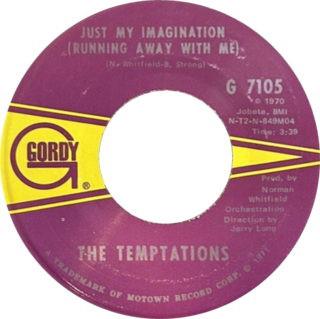
"Just My Imagination (Running Away with Me)" is a song by American soul group the Temptations, written by Norman Whitfield and Barrett Strong. Released on the Gordy (Motown) label, and produced by Norman Whitfield, it features on the group's 1971 album, Sky's the Limit. When released as a single, "Just My Imagination" became the third Temptations song to reach number one on the US Billboard Hot 100. The single held the number one position on the Billboard Pop Singles Chart for two weeks in 1971, from March 27 to April 10. "Just My Imagination" also held the number one spot on the Billboard R&B Singles chart for three weeks, from February 27 to March 20 of that year.
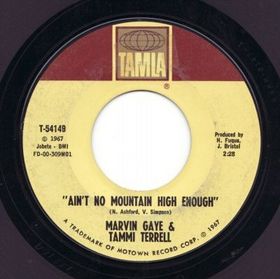
"Ain't No Mountain High Enough" is a song written by Nickolas Ashford & Valerie Simpson in 1966 for the Tamla label, a division of Motown. The composition was first successful as a 1967 hit single recorded by Marvin Gaye and Tammi Terrell, and became a hit again in 1970 when recorded by former Supremes frontwoman Diana Ross. The song became Ross's first solo number-one hit on the Billboard Hot 100 chart and was nominated for the Grammy Award for Best Female Pop Vocal Performance.

T-Neck Records was a record label founded by members of the R&B/soul group The Isley Brothers in 1964, which became notable for distributing the first nationally-released recordings of Jimi Hendrix, their guitarist, and which later became a successful label after the Isleys began releasing their own works after years of recording for other labels, scoring hits such as "It's Your Thing" (1969) and "That Lady" (1973).
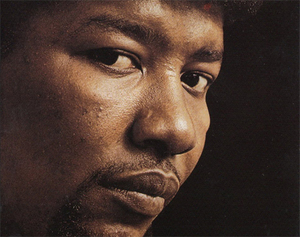
William McKinley Hutchison, better known as Willie Hutch, was an American singer, songwriter as well as a record producer and recording artist for the Motown record label during the 1970s and 1980s.

Soulsation! is a 4-CD box set of music recorded by The Jackson 5 during their tenure at Motown Records from 1969 to 1975, when they left Motown for CBS Records. The box set was released in 1995 to celebrate the 25th anniversary of The Jackson 5 becoming the first group to have its first four singles go straight to #1 on the US Billboard charts. Soulsation! included an introduction from the group's youngest sister Janet, liner notes from David Ritz and an essay from the brothers' first producer, Bobby Taylor. The fourth disc features 17 previously unreleased songs, most recorded from mid-1969 to early 1972. The set also includes solo numbers from brothers Michael, Jermaine, and Jackie.

Leon Ware was an American songwriter, producer, composer, and singer. Besides a solo career as a performer, Ware was best known for producing hits for other artists including Michael Jackson, Quincy Jones, Maxwell, Minnie Riperton and Marvin Gaye, co-producing the latter's album, I Want You.

Marvin Earl Johnson was an American R&B singer, songwriter and pianist. He was influential in the development of the Motown style of music, primarily for the song "Come to Me," which was the first record issued by Tamla Records, the precursor to the famous label.
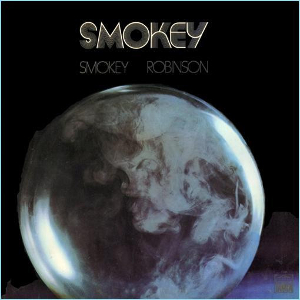
Smokey is the debut studio album by American soul singer, songwriter, and producer Smokey Robinson. It was released on June 19, 1973, by Tamla Records and was Robinson's first solo record after his departure from The Miracles. The album featured the single "Sweet Harmony", which was his tribute to his former singing partners in the Miracles: Bobby Rogers, Pete Moore and Ronnie White. Smokey was arranged by Dave Blumberg, Gene Page and Willie Hutch. It also featured the song "Baby Come Close", his first solo hit single, and the single "Just My Soul Responding", a protest song dealing with ghetto life in America, and the plight of the American Indian. Smokey peaked at number 70 on the Billboard albums chart, on which it spent 19 weeks.

"Got to Be There" is the debut solo single by the American recording artist Michael Jackson, written by Elliot Willensky and released as a single on October 7, 1971, on Motown Records. The song was produced by Hal Davis and recorded at Motown's Hitsville West studios in Hollywood.

"I Wanna Be Where You Are" is a song written by Arthur "T-Boy" Ross and Leon Ware for Michael Jackson, who took the song to number 7 in Cash Box and number 16 on the Billboard Hot 100 pop chart. It also reached number 2 on the Billboard R&B singles chart in 1972.

"(Your Love Keeps Lifting Me) Higher and Higher" is an R&B song written by Gary Jackson, Raynard Miner, and Carl Smith. It was recorded by Jackie Wilson for his album Higher and Higher (1967), produced by Carl Davis, and became a Top 10 pop and number one R&B hit.

"Neither One of Us (Wants to Be the First to Say Goodbye)" is a song recorded by Gladys Knight & the Pips. Released on December 26, 1972 on Motown's Soul Records imprint as S 35098, it became one of their biggest hit singles to date, and was also the last single the group released prior to them leaving Motown for Buddah Records in February 1973.

Renaissance is a 1973 album by R&B group The Miracles on Motown Records' Tamla label. It was the first album by the group not to feature original lead singer Smokey Robinson on lead vocals, instead featuring him as executive producer. Robinson was replaced by lead singer Billy Griffin.

"Gonna Give Her All the Love I've Got" is a 1967 Soul song, originally recorded and made a hit by Jimmy Ruffin on Motown's Soul Label imprint. Ruffin's 1967 original version, from his album Jimmy Ruffin Sings Top Ten, reached the Pop Top 30, peaking at #29, and was a Top 20 R&B Hit as well, peaking at #14. It was also a hit in Britain, reaching #26 on the UK Singles Chart. The song has a social context: it depicts a man anticipating his release from prison on the morrow, when he'll return home on a train to "the girl that I left behind," promising himself that he will reward her steadfast love for him by "giv[ing] her all the love [he's] got." The song was written by Norman Whitfield and Barrett Strong and produced by Whitfield.
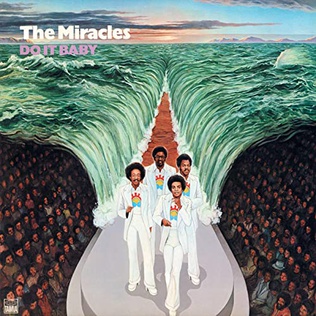
"Do It Baby" (TS334), was a 1974 R&B album by The Miracles issued on Motown's Tamla subsidiary label. It was noted as the second album by the group featuring new lead singer Billy Griffin, after the departure of original Miracles lead singer Smokey Robinson two years earlier. This was the first-ever Miracles album which had absolutely no creative input from Robinson whatsoever. While the group's first album with Griffin, Renaissance, was critically acclaimed but commercially unsuccessful, "Do It Baby" was much more successful, reaching No. 41 on the Billboard pop albums chart and No. 4 of the Billboard R&B albums chart.
"Do What You Gotta Do" is a song that was written by Jimmy Webb. It was first recorded by Johnny Rivers and released on his 1967 album Rewind. In 1968, it was an R&B hit for Al Wilson. It was also a hit for Nina Simone that year and a local hit for New Zealand band Larry's Rebels.
















